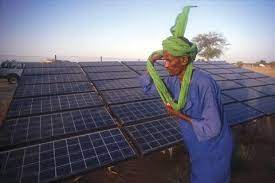Africa needs “substantial funding” from a range of partners if it is to make a success of its green transition, according to a number of experts meeting in Egypt.
The mobilisation of funding to combat climate change and promote green growth on the continent was the subject of a panel discussion held on Wednesday 24 May in Sharm el-Sheikh, on the sidelines of the Annual Meetings of the African Development Bank (AfDB). While the contribution of private donors has “increased significantly since 2010”, the landscape is still “heavily dominated” by non-private players, noted experts taking part in the event.
With this in mind, they recommended “close” collaboration between the private and public sectors “to better finance the green transition in Africa”. This joining of forces must be motivated by the budgetary situation of African countries, which “has been deteriorating steadily in recent times” as a result of a number of tensions and crises, including the budget deficit exacerbated by the effects of the COVID-19 pandemic, rising interest rates and inflation, currency devaluations and geopolitical tensions.
“Our mission is to create a sustainable future for Africa. The impact of climate change that we see every day is creating a lot of volatility and making countries and communities vulnerable. As an institution, we want to be a force for solutions”, proposed Msizi Khoza, Head of Environment, Social and Governance at the South African bank Absa Bank CIB, stressing that the continent needs substantial financing and no single partner can provide it alone.
“When we look at the needs, we realise that we need to cooperate, to put in place mixed concessional financing to enable customers to have the necessary financing but at accessible rates. We need to create the right framework. We need to reach out to each other”, he pleaded.
Boitumelo Mosako, Managing Director of the Development Bank of Southern Africa (DBSA), emphasised the Bank’s commitment to climate finance, pointing out that the institution she represents has invested 300 billion rand, or nearly 9,500 billion CFA francs, in a renewable energy project, one of its main areas of investment along with energy, transport, infrastructure and, more recently, water, health and education. “We need to help the countries we serve build resilient, carbon-free economies (…). At DBSA, we are working closely with the governments of southern African countries”, she explained.
The speakers agreed that the public sector has the power and the mandate to develop the policies, regulations and institutions that will facilitate the growth of the private sector. It must therefore “engage in policy frameworks” that promote development and encourage investment by the private sector, which has the resources, expertise and flexibility to identify and exploit growth opportunities in Africa.
As part of this process, the private sector can “commit essential financing” to renewable energy projects, energy efficiency in buildings, sustainable agricultural practices and infrastructure, while bringing innovation and entrepreneurship to Africa’s green transition, they said.
“Africa is well placed when it comes to the green economy, especially in carbon. Let’s work together, let’s get closer together to harmonise these regulations in terms of green finance”, recommended Ramy El Dokany, Chairman of the Egyptian Stock Exchange.
ODL/ac/lb/as/APA


